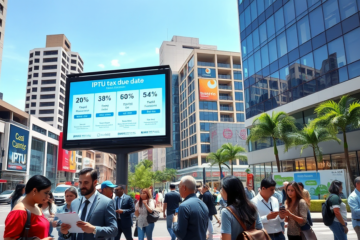Brazilian Coffee Shows Optimism for Future Exports
Brazilian Coffee is one of Brazil's most emblematic products and, currently, industry entities are optimistic about the possibility of resuming exports to the United States.
In this article, we will explore the impact of the recent tariff exemption decree, the export history, and the consequences of the 50% tariff imposed in August.
Additionally, we will discuss the recognition of coffee as a valuable commodity for American industry and how this can facilitate future bilateral negotiations between the two countries.
Optimism in the Brazilian Coffee Sector Due to the Resumption of Exports
In recent months, Brazilian coffee sector entities have demonstrated a renewed optimism with the possibility of resuming exports to the United States.
This feeling was intensified after the issuance of a US decree dated September 5, which included coffee in a list of products potentially tariff-free, provided that a commercial agreement is signed.
Before the imposition of a 50% tariff in August, Brazil was the largest supplier of coffee to the US, accounting for one-third of US imports.
The entities see this new opportunity as an important step towards realigning commercial interests between the two countries.
As mentioned by Cecafé, the recognition of coffee as a valuable product for the American market can facilitate future bilateral negotiations.
This opening in trade relations could not only economically benefit Brazilian producers and exporters, but also consolidate Brazil's image as a leader in the global coffee market.
Diplomatic conversations between leaders of the two countries, such as Trump's initiatives as a nod to President Lula, further broaden the prospect of a productive and constructive debate in the pursuit of tariff exemption.
Impact of the September 5 Decree on Sector Expectations
The decree of September 5th signed by the United States government establishes the possibility of exemption from tariffs for specific products, including Brazilian coffee.
This measure offers a significant opportunity for Brazil to resume its coffee exports to the American market under more advantageous conditions.
The tariff exemption, however, is conditional on the establishment of a trade agreement between the two countries.
Currently, Brazilian coffee exports to the United States face a tariff of 50%, which has hindered the competitiveness of Brazilian products on American soil.
Before the imposition of this tariff, Brazil enjoyed a privileged position, accounting for one-third of the US coffee market.
Therefore, the implementation of the exemption can restore the flow of trade in an advantageous manner.
Three important points stand out:
- The exemption will only be effective with a commercial agreement.
- Coffee is among the products eligible for this benefit.
- The appreciation of Brazilian coffee could facilitate future negotiations.
This context feeds the hope of Brazilian entities in the coffee sector.
The inclusion of coffee as a potentially processed product highlights its value in international trade, which could unlock essential negotiations between countries.
To learn more about the impact of this decision, check out the detailed article in Folha do Estado Newspaper.
Decline in Brazilian Exports After the 50% Tariff and Historical Relevance
In recent years, Brazil has emerged as the main supplier of coffee to the United States, holding a third of the American market and consolidating its importance in this sector.
However, the imposition of a 50% tariff on coffee exports in August 2023 caused a drastic drop in sales, generating serious concerns among Brazilian exporters.
The historical relevance of coffee to the Brazilian economy and its position in international trade are now under threat, as bilateral negotiations demand a trade agreement that restores export competitiveness.
Before the Tariff: Brazil's Leadership
Brazil was responsible for about a third of the US coffee market before the implementation of the tariff in August.
This leadership position was supported by several crucial variables.
First, the high quality and variety of Brazilian beans made the country an attractive choice for American importers.
Furthermore, the competitive cost of Brazilian coffee, combined with its constant availability, contributed to its popularity in the North American market.
The trade relationship between the two countries was favored by logistical proximity compared to other major producers such as Vietnam and Colombia.
During this pre-tariff period, increased domestic demand in the U.S. for high-quality coffee helped strengthen the Brazilian presence in the market.
It is also important to consider the aspect that Brazil had a well-developed export infrastructure, which facilitated efficient distribution to the US.
This solid infrastructure was complemented by previously established trade agreements that reduced bureaucratic obstacles, allowing Brazil to remain the main supplier.
For further reference, see the full review on how Trump's tariff affected the market.
Therefore, the scenario that prevailed before the tariffs provided a favorable environment for Brazil to maintain a dominant position in the supply of coffee to the United States.
After the Tariff: Abrupt Drop in Exports
The imposition of a tariff of 50% on Brazilian coffee exports to the United States resulted in a dramatic fall in sales, significantly impacting the market.
According to data from the [Brazilian Specialty Coffee Association](Access more Statistics), shipments of specialty coffees fell almost 80% in August.
This reduction generated critical economic repercussions, reducing Brazil's competitiveness in the international coffee market and harming the profitability of local producers.
Furthermore, foreign exchange earnings from exports have also fallen sharply, contributing to a challenging economic scenario.
A long negotiation between Brazil and the United States could reverse this situation, revitalizing the Brazilian coffee sector.
Recognition of Coffee as a Valuable Product for Future Bilateral Negotiations
Brazilian coffee plays a crucial role in the American economy, accounting for more than 30% of the US coffee market.
This participation highlights Brazil as the main supplier and highlights the American dependence on this valuable product.
The recognition of Brazilian coffee for its relevance for American industry paves the way for positive trade negotiations.
Trade policies favorable conditions could result in a more stable socio-economy between the two countries.
Furthermore, bilateral strategies can generate growth of the sector, boost the Brazilian economy and provide significant commercial advantages.
With the possibility of tariff exemption, Brazil would be even more competitive in the American market, benefiting farmers and exporters.
- Strengthening commercial ties.
- Economic stability for producers.
- Expanded market access.
The incorporation of coffee into the list of tariff-free products would indicate a clear recognition of its economic importance, stimulating future bilateral negotiations and promoting prosperity for both countries.
Brazilian Coffee has great potential to return to the American market.
The recent change in tariff policies opens up new possibilities and highlights the importance of coffee in the global economy.



0 Comments